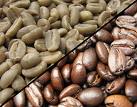
Brad Smith of Distant Lands Coffee looks on as Jason breaks the Franke unit down to get the perfect Parameters
How do we taste coffee?..........
> Our palates perceive four basic tastes: salt, sweet, bitter and sour.
> Acidity describes the bright and dry taste of coffee, and refers to both mouthfeel andtaste. A coffee that is high in acid is tingly and almost effervescent on the tongue,which becomes more evident as the coffee cools. Acidity produces crisp, pleasantly tart fruit flavors. This taste perception ranges from slightly sweet to slightly sour.
> Strength refers to the intensity measure of the amount of total dissolved solids (TDS)in the brew. TDS is the portion of the minerals dissolved in water that can pass
through a very small filter.
Body (Mouthfeel or Texture)
Try this experiment: while plugging your nose, try to distinguish the difference between coffee and water. Then try to distinguish the taste differences. You should not be able to distinguish between different varieties of coffee, but you can still distinguish between coffee and water because of mouthfeel.
> Intensity and dimensionality. Intensity is the strength of any of these taste
components; dimensionality is the story the coffee tells—the sequential arrangement
of flavors, aromas, and texture.
> What gives coffee its body? Brew colloids. These micro-sized particles are suspended in liquid coffee, too small to pass through most coarse filtering systems. They are non-dissolved, and do not settle out under the force of gravity. They give texture to the body of coffee and contribute to the flavor.
Aftertaste
> Taste continues to develop even after you have swallowed or spit out the coffee.
Something that hits you as pleasantly sweet at first may turn sour after thirty seconds of development on the tongue.
> Both taste and body come into play with aftertaste; you may still be able to feel a
coffee in your mouth, but the taste may not be as strong.







No comments:
Post a Comment